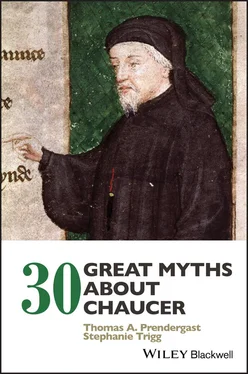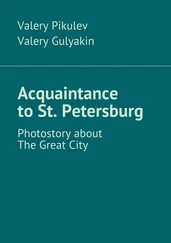This is one of the areas in which Chaucer’s poetic language was more distinctive, and indeed when his successors praised his innovations, it was often in terms of this more elevated, “laureate” and adorned style, though now we would prefer to praise the subtle and fluid movements between different styles in his work.
Recent work on the linguistic context of fourteenth‐century England also emphasizes its multicultural nature, and many of these words would still have been experienced as borrowings. For Butterfield, for example, there were two vernacular languages in late medieval England: English and French. She also reminds us of the distinction between continental French and Anglo‐French, 12 which was still the dominant language of the English court in the fourteenth century. There is only limited evidence to suggest that the Ricardian court embraced this new English poetic tradition; and indeed, Christopher Cannon suggests that in Chaucer’s time, “the use of English in literature remained rebellious, even if not politically charged,” through its associations with the Wycliffite movement promoting English religious literacy, and the use of English in some political and legal contexts. 13 Moreover, it has been suggested that poetry in English was really taken up in even a semi‐official way only by the Lancastrians under Henry IV, and more particularly by Henry V, well after the death of Chaucer in 1400. 14
We can confidently “bust” this myth, then. Chaucer was far from the first English poet, and while his own poetic followers were quick to applaud and praise his originality, his apparent primacy in this regard is the effect of much larger historical forces and critical desires.
1 1Bede, An Ecclesiastical History of the English People, in The Norton Anthology of English Literature, Volume A: The Middle Ages, ed. James Simpson and Alfred David, 9th edn. (New York: W.W. Norton, 2012), 30–31.
2 2Christopher Cannon , Middle English Literature: A Cultural History (Cambridge: Polity Press, 2008), 39.
3 3James Wimsatt, Chaucer and the Poems of “Ch” (Kalamazoo, MI: Medieval Institute Publications, 2009), 12–14.
4 4Marion Turner , Chaucer: A European Life (Princeton, NJ: Princeton University Press, 2019), 128.
5 5Ibid., 129.
6 6Ardis Butterfield , The Familiar Enemy: Chaucer, Language, and Nation in The Hundred Years War (Oxford: Oxford University Press, 2009), 11.
7 7Turner, Chaucer: A European Life, 330.
8 8Simon Horobin , Chaucer’s Language , 2nd edn. (Houndmills: Palgrave Macmillan, 2013), 2.
9 9David Burnley, A Guide to Chaucer’s Language (Houndmills: Macmillan, 1983), 133.
10 10Horobin, Chaucer’s Language, 83.
11 11Ibid., 128.
12 12Butterfield, The Familiar Enemy, 11.
13 13Cannon, Middle English Literature, 70.
14 14John H. Fisher , “A Language Policy for Lancastrian England,” PMLA 107, no. 5 (1992), 1168–80.
Myth 3
CHAUCER SUFFERED AN UNREQUITED LOVE
The idea that youthful poets should be inspired by love, and preferably the unrequited love of a beautiful, unavailable noblewoman, is of very long standing in the West. It is a tradition that goes back to Catullus and it features in the poetry of Dante, and the sonnet cycles of Philip Sidney and William Shakespeare. Chaucer certainly presents himself as unlucky or unhappy in love, especially early in his career, in dream‐vision poems such as The Book of the Duchess and The Parlement of Foules . 1 In the mid‐career Troilus and Criseyde , the fiction of personal unhappiness has been displaced by a general sense of his “unlikynesse” in love (I. 16). If he is an unsuitable candidate for love, he argues, he may nevertheless serve love’s devotees by writing their stories and providing a vocabulary and narratives for love. In this poem, Chaucer passes the role of slightly comical unrequited lover on to Criseyde’s uncle Pandarus, whose own desire seems to be displaced onto the sexual union of the younger lovers.
These poems about love voiced through the misery and self‐deprecating humor of the unhappy, unrequited lover give psychological depth and dramatic tension to the idea of desire in the psychoanalytic sense: desire that desires nothing more than to perpetuate its own state. As Chaucer writes mockingly in the poem “To Rosamounde,” “I brenne ay in an amorous pleasance” (l.22). The continuation of such pleasant desire comes to constitute an argument for the amorous and erotic power of love poetry, especially for noble readers who are interpellated in this way as more worthy of, or ennobled by, such suffering than incompetent bourgeois or clerkly poets. The reading and circulation of such poetry perpetuate the myth of the deeper aristocratic capacity for suffering that is also ennobling.
By the time of writing the Canterbury Tales , Chaucer’s narrative persona has been modified once more, as the Host describes him as a childlike, cuddly darling: “This were a popet in an arm t’enbrace / For any womman, smal and fair of face” (VII.701–2; see Myth 24).
Early Chaucer criticism often sought to identify an autobiographical motivation in his writing, and the opening lines of his early dream‐vision poem The Book of the Duchess have been much discussed in this light. The poem features a leisurely introduction in which the poet complains that he has been unable to sleep for a long time:
I holde it be a sicknesse
That I have suffred this eight yeer;
And yet my boote is never the ner,
For there is phisicien but oon
That may me hele;
(ll.36–40)
The idea that one might suffer the sickness of unrequited love for such a long time is a familiar trope in medieval poetry, and in modern criticism this passage is often “explained away” as a simple imitation of a European convention of courtly poetry: the poet establishes his credentials for writing about love by invoking the depth of his own feeling.
Yet in older biographical and critical traditions, this passage generated some heated debate about whether Chaucer was paying a compliment, either heartfelt or performative, to a lady of the court. This tradition goes back at least to William Godwin’s biography of 1804, which suggested Chaucer was the “unsuccessful lover of the lady to whom he professes himself attached.” 2
Godwin based his claim on the passage from The Book of the Duchess , a reading of The Parliament of Foules and a third work known as Chaucer’s Dream . In this poem, the narrator dreams that his beloved consents to his suit but awakens to find it is a delusion: “Lo, here my blisse! lo, here my paine! / Which to my ladie I complaine, / And grace and mercy her requere, / … / That of my dremé [ sic ] the substaunce / Might turnen once to cognisaunce.” 3 If we believe that the narrator is actually referencing his personal experience and that the narrator is Chaucer, then it would seem that the poem confirms Godwin’s notion that Chaucer suffered from unrequited love. The poem was first included in Thomas Speght’s 1598 edition of Chaucer and was accepted by Thomas Tyrwhitt as genuine, so Godwin had good reason to believe that the poem was by Chaucer. By the late nineteenth century, however, scholars had begun to question the Chaucerian attribution, and by 1878 it had been relegated to the ever‐growing Chaucerian apocrypha (it was ultimately renamed The Isle of Ladies ).
Despite this setback, some critics continued to insist that the passage from The Book of the Duchess (even in the absence of the evidence from Chaucer’s Dream ) was a direct reference to an unsuccessful love suit to some high‐placed member of the court. The most frequently named contender was Joan of Kent, the mother of Richard II. 4 Margaret Galway argues that Chaucer would have traveled to Aquitaine with Gaunt in 1370, and would have read his “important new poem at the English court in Angoulême” with Joan (the “Fair Maid”) of Kent presiding. 5 The poem would thus have been a courtly compliment to his hostess and her son. Galway goes even further to suggest that Joan “was evidently the subject of all [Chaucer’s] extant serious love‐poems,” especially identifying her with Alceste in The Legend of Good Women . 6 Galway argues that Chaucer would have known Joan before her marriage to the Prince of Wales: “it is a priori not improbable that the young court poet paid Joan the compliment of posing as one of her disappointed admirers and vowing that he would always remain her faithful servant.” 7 (Nevertheless, others suggest that the reference to Alceste in the Legend is a compliment to Anne of Bohemia, Richard II’s first wife. 8 )
Читать дальше












